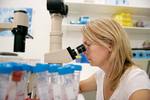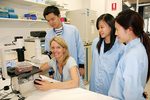Sex hormone key to women's health
 Reproductive Health Reproductive Health
A sex hormone commonly thought to be specific to men will be the focus for biomedical researcher Dr Theresa Hickey, who will spend the next four years investigating its role in women's health and disease. The University of Adelaide postdoctoral researcher has recently been awarded a Peter Doherty Australian Biomedical Fellowship to investigate the role of androgen receptor activity in the development of breast cancer and diseases of the ovary. Dr Hickey will work in collaboration with some of Australia's leading biomedical experts in the Dame Roma Mitchell Cancer Research Laboratories and the Research Centre for Reproductive Health. Androgens are present in both male and female bodies, although men make approximately 10 times more of these sex hormones than women do, Dr Hickey said. "Women convert about half of their androgen to oestrogen, the hormone that is essential for normal female sexual development. The androgen that does not get converted to oestrogen in women is what interests me. "We know too much or too little androgen can disrupt female physiology in a major way, but we're still unsure precisely how androgens work in women. That will be the focus of my research," Dr Hickey said. "In part, it appears that androgens play a balancing act in controlling the activity of oestrogen in a woman's body." Surprisingly little work has been done in this area, despite the importance of androgen and oestrogen in both sexes. Dr Hickey spent her early research years investigating the link between androgen receptors, which mediate the effects of androgen in the body, and prostate cancer in men. Her attention has now turned to the role that androgens play in some critical female health problems. "Research suggests that weak or disrupted androgen activity promotes the development of breast cancer in susceptible individuals and may cause early failure of ovarian function. "Too little androgen activity can also result in loss of female libido and weak bones. On the other hand, too much androgen activity is a characteristic feature of conditions like polycystic ovary syndrome (PCOS), hirsutism (excessive hair) and acne in women." Dr Hickey said many common environmental pollutants, as well as some oral contraceptives and hormone replacement therapies, contain substances which potentially interfere with normal androgen action in the female body. "We now know that disrupted androgen activity not only causes major psychological problems and infertility for women, but other life-threatening health conditions. For example, a link between excess androgen, Type 2 Diabetes and metabolic syndrome in women has recently been revealed." The National Health and Medical Research Council (NHMRC) awarded the Fellowship Grant earlier this year. It comes on top of a three-year Project Grant awarded to Dr Hickey and her colleagues in 2006 to investigate androgen activity in the ovary. Professor Robert Norman from the Research Centre for Reproductive Health and Professor Wayne Tilley from the Dame Roma Mitchell Cancer Research Laboratories will collaborate with Dr Hickey on her research. The postdoctoral researcher spent 2006 writing up her PhD thesis on the role that androgen receptors play in the development of PCOS, a condition that affects one in 15 women of childbearing age. Dr Hickey's research has won national and international acclaim, including awards from the Society for Reproductive Biology (Aus), Australian Women in Endocrinology, The Queen Elizabeth Hospital Research Foundation, and the Androgen Excess Society (USA). "Last year was a stellar year for me and I'm hoping that by the end of 2007 we will have made some real progress in this field," Dr Hickey said. Story by Candy Gibson
|





